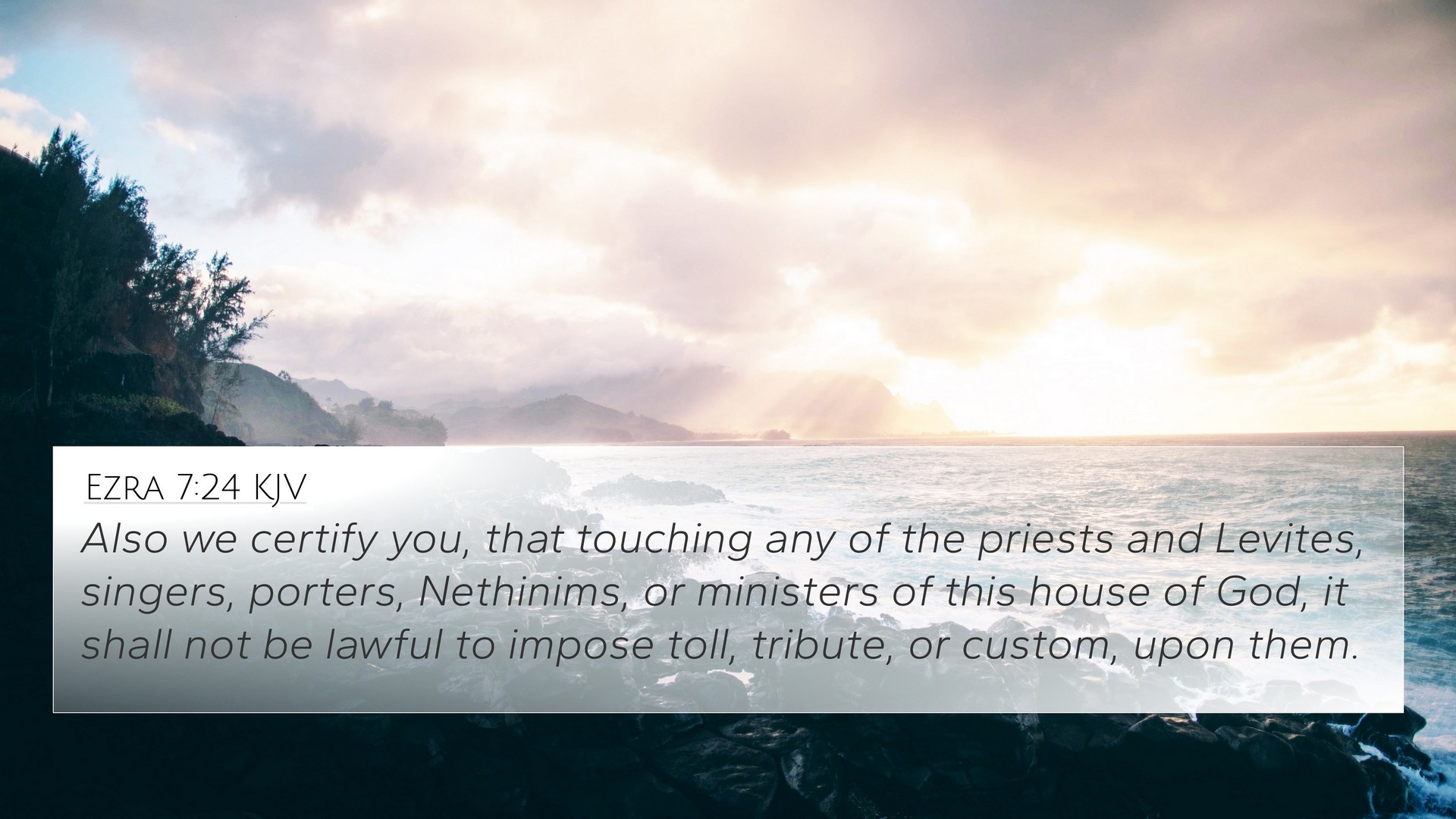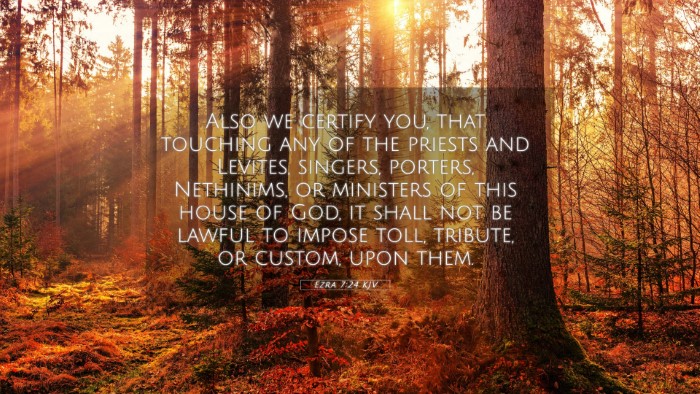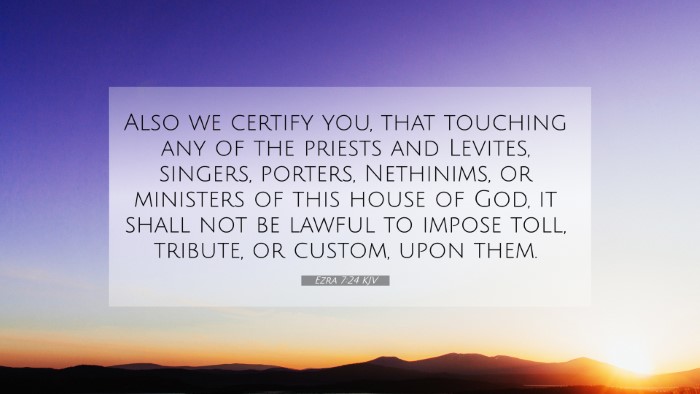Old Testament
Genesis Exodus Leviticus Numbers Deuteronomy Joshua Judges Ruth 1 Samuel 2 Samuel 1 Kings 2 Kings 1 Chronicles 2 Chronicles Ezra Nehemiah Esther Job Psalms Proverbs Ecclesiastes Song of Solomon Isaiah Jeremiah Lamentations Ezekiel Daniel Hosea Joel Amos Obadiah Jonah Micah Nahum Habakkuk Zephaniah Haggai Zechariah MalachiEzra 7:24 Similar Verses
Ezra 7:24 Cross References
Also we certify you, that touching any of the priests and Levites, singers, porters, Nethinims, or ministers of this house of God, it shall not be lawful to impose toll, tribute, or custom, upon them.
Uncover the Rich Themes and Topics of This Bible Verse
Listed below are the Bible themes associated with Ezra 7:24. We invite you to explore each theme to gain deeper insights into the Scriptures.
Ezra 7:24 Cross Reference Verses
This section features a detailed cross-reference designed to enrich your understanding of the Scriptures. Below, you will find carefully selected verses that echo the themes and teachings related to Ezra 7:24 KJV. Click on any image to explore detailed analyses of related Bible verses and uncover deeper theological insights.

Ezra 4:13 (KJV) »
Be it known now unto the king, that, if this city be builded, and the walls set up again, then will they not pay toll, tribute, and custom, and so thou shalt endamage the revenue of the kings.
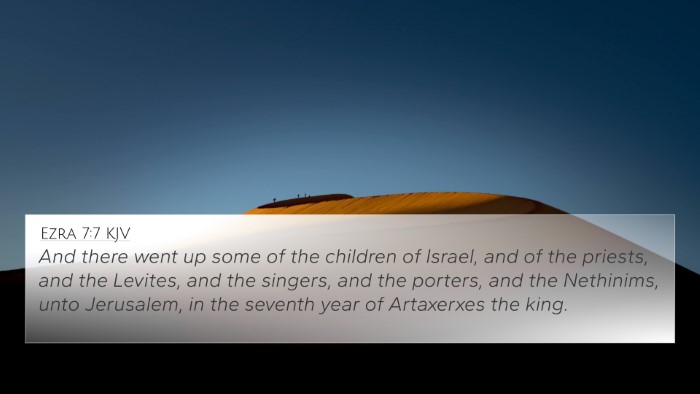
Ezra 7:7 (KJV) »
And there went up some of the children of Israel, and of the priests, and the Levites, and the singers, and the porters, and the Nethinims, unto Jerusalem, in the seventh year of Artaxerxes the king.
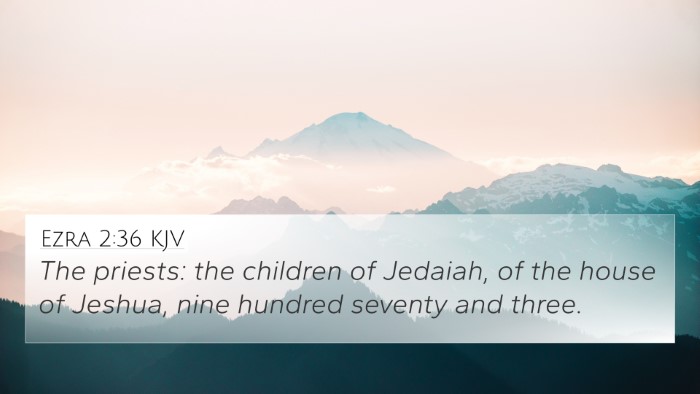
Ezra 2:36 (KJV) »
The priests: the children of Jedaiah, of the house of Jeshua, nine hundred seventy and three.

Ezra 4:20 (KJV) »
There have been mighty kings also over Jerusalem, which have ruled over all countries beyond the river; and toll, tribute, and custom, was paid unto them.
Ezra 7:24 Verse Analysis and Similar Verses
Understanding Ezra 7:24
The verse Ezra 7:24 states:
"Also we inform you that it shall not be lawful to impose tribute, custom, or toll upon any of the priests, Levites, singers, porters, Nethinim, or servants of this house of God."
This verse emphasizes the exemption of certain groups from taxation, specifically those serving in the temple. It carries significant implications regarding the treatment of religious figures and their roles in society, particularly in relation to their duties within the house of God.
Summary of Insights from Public Domain Commentaries
- Matthew Henry: Emphasizes the protection granted to the temple servants, highlighting the importance of their work in maintaining the spiritual and religious life of the community. Henry notes the role of divine providence in maintaining support for those who minister before God.
- Albert Barnes: Points out that this decree not only alleviates the burdens of taxation but also acknowledges the sacredness of their service. Barnes draws parallels with how religious duties should be supported and protected, aligning with the biblical principle of taking care of those dedicated to God’s work.
- Adam Clarke: Discusses the historical context of the verse, indicating how it reflects the sentiments of both Jewish law and Persian governance. Clarke suggests that the exemption is a recognition of the uniqueness of religious functions and the necessary provision for those who dedicate their lives to God's service.
Theming of Religious Exemptions
This verse can be viewed through the lens of thematic Bible verse connections, where it underscores the broader biblical principle that those who serve in spiritual capacities should receive support and exemption from worldly burdens.
Bible Cross-References
Ezra 7:24 can be cross-referenced with the following verses:
- Numbers 18:26: Discusses the Levites receiving tithes from the Israelites for their service to God.
- Malachi 3:10: Encourages bringing tithes and offerings into the storehouse, furthering the support for religious duties.
- 1 Timothy 5:17-18: Notes the honor and support due to elders who labor in preaching and teaching, akin to the priestly class.
- Luke 10:7: Jesus teaches that the laborer deserves his wages, reinforcing the need to provide for those engaged in spiritual work.
- Acts 6:4: The apostles decide to dedicate themselves to prayer and the ministry of the word, necessitating support from the community.
- Galatians 6:6: "Let him who is taught the word share in all good things with him who teaches," supporting the theme of provision for spiritual leaders.
- Hebrews 13:17: Exhorts believers to obey their leaders and submit to them, as they watch over souls, again relating to the theme of support and recognition.
Applying Cross-Referencing in Biblical Study
Utilizing tools for Bible cross-referencing can greatly enhance your understanding of passages like Ezra 7:24. Here are some tips on how to find cross-references in the Bible:
- Use a Bible Concordance: Look up key terms to find related verses.
- Refer to a Bible Cross-Reference Guide: Many Bibles come with reference notes or inserted cross-references.
- Engage in Comprehensive Bible Study: Cross-reference thematic studies to uncover patterns and connections among scriptures.
- Explore Inter-Biblical Dialogues: Compare teachings across the Old and New Testaments to deepen your understanding.
Conclusion
Ezra 7:24 serves as a remarkable example of the intertwining of theology, history, and community practice. By examining this verse alongside its cross-references, we can gain a deeper appreciation for how God provisions those who commit their lives to His service. Through systematic cross-referencing, you can uncover rich insights and connections between Bible verses, enhancing your understanding of scripture as a cohesive whole.
